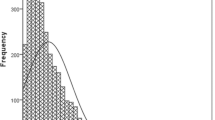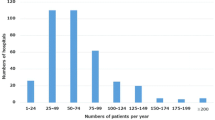Abstract
Background: Studies have shown that the survival of patients with gastric adenocarcinoma is related to the number of regional lymph nodes with metastases. The probability of identifying node-positive cancers increases with the number of lymph nodes resected and examined. It has been recommended that at least 15 lymph nodes be removed and examined for adequate staging. Prospective randomized studies have shown the lymph node yield is much greater with the D2 resection than the D1. This study evaluated the relative contribution of both the number of resected lymph nodes and the extent of gastric resection (D1/D2) on the outcome of patients with proximal gastric cancer.
Methods: The medical records of 114 patients with adenocarcinoma of the proximal stomach, who underwent a curative gastric resection, were reviewed. Patients were stratified into four groups, i.e., two groups, D1/D1.5 and D2/D2.5, based on the extent of resection, and two groups based on the number of lymph nodes removed, fewer than 15 lymph nodes and 15 or more lymph nodes. Survival was determined by the method of Kaplan-Meier and differences compared by the log-rank test. Multivariate analysis was performed by using the Cox model.
Results: The number of resected lymph nodes had no effect on the survival of the group as a whole. A significant improvement in survival was noted for patients with a D2 or greater resection. The median survival of patients with 15 or more lymph nodes resected improved from 25 months to 42 months when treated with an extended resection, (D2 or D2.5). Resection of 15 or more lymph nodes alone, or combined with an extended resection, resulted in a statistically significant improvement in survival for patients in American Joint Committee on Cancer Staging (AJCC) stage II.
Conclusions: Both resection of 15 or more lymph nodes and extended lymphadenectomy contributed to the survival advantage observed in patients with AJCC stage II gastric cancer. The D2 gastric resection prolonged the median survival time and improved the 5-year survival rate for patients with 15 or more resected lymph nodes.
Similar content being viewed by others
References
Dahlberg M, Glimelius B, Pahlman L. Improved survival and reduction in local failure rates after preoperative radiotherapy: evidence for the generalizability of the results of Swedish rectal cancer trial. Ann Surg 1999;229:493–497.
Poulin EC, Mamazza J, Schlachta CM, Gregoire R, Roy N. Laparoscopic resection does not adversely affect early survival curves in patients undergoing surgery for colorectal adenocarcinoma. Ann Surg 1999;229:487–492.
Cuschieri A, Fayers P, Fielding J, et al. Postoperative morbidity and mortality after D1 and D2 resections for gastric cancer: preliminary results of the MRC randomised controlled surgical trial. Lancet 1996;347:995–999.
Bonenkamp JJ, Hermans J, Sasako M, van de Velde CJH. Extended lymph-node dissection for gastric cancer. N Engl J Med 1999;340:908–914.
Japanese Research Society for Gastric Cancer. Treatment results of gastric carcinoma in Japan, 39th report of nation-wide registry in 1979–1982, Kanehana Publishers, Tokyo, 1995.
Noguchi Y, Imada T, Matsumoto A, Coit DG, Brennan MF. Radical surgery for gastric Cancer: a review of the Japanese experience. Cancer 1989;64:2053–2062.
Maruyama K, Okabayashi K, Kinoshita T. Progress in gastric cancer surgery in Japan and its limits of radicality. World J Surg 1987;11:418–426.
Volpe CM, Koo J, Miloro SM, Driscoll DL, Nava HR, Douglass HO Jr. The effect of extended lymphadenectomy on survival in patients with gastric adenocarcinoma. J Am Coll Surg 1995;181:56–64.
Jatzko GR, Lisborg PH, Denk H, Klimpfinger M, Stettner HM. A 10-year experience with Japanese-type radical lymph node dissection for gastric Cancer outside of Japan. Cancer 1995;76:1302–1312.
Siewert JR, Bottcher K, Roder JD, Busch R, Hermanek P, Meyer HJ. Prognostic relevance of systematic lymph node dissection in gastric carcinoma. Br J Surg 1993;80:1015–8.
Sue-Ling HM, Johnston D, Martin IG, et al. Gastric cancer: a curable disease in Britain. BMJ 1993;307:591–596.
Hermanek P, Hutter RVP, Sobin LH, Wagner G, Wittekind C. UICC Illustrated Guide to the TNM/pTNM Classification of Malignant Tumours. 4th edn. New York: Springer-Verlag, 1997.
Bunt AMG, Hermans J, van de Velde CJH, et al. Lymph node retrieval in a randomized trial on western-type versus Japanesetype surgery in gastric cancer. J Clin Oncol 1996;14:2289–2294.
Bunt AMG, Hogendoorn PCW, van de Velde CJH, Bruijn JA, Hermans J. Lymph node staging standards in gastric cancer. J Clin Oncol 1995;13:2309–2316.
Kajitani T, Japanese Research Society for Gastric Cancer. The general rules for the gastric cancer study in surgery and pathology: parts I and II. Jpn J Surg 1981;11:127–145.
Kaplan EL, Meier P. Nonparametric estimation from incomplete observations. J Am Stat Assoc 1958;53:457–486.
Cox DR. Regression models and life tables. J R Stat Soc B 1972;34:187–220.
Brennan MF, Karpeh M. Surgery for gastric cancer: the American view. Semin Oncol 1996;23:352–359.
Kern KA. Natural history of surgically treated gastric cancer. In: Sugarbaker PH, ed. Management of Gastric Cancer. Boston: Kluwer Academic, 1991:532–536.
Kelsen DP. Adjuvant and neoadjuvant therapy for gastric cancer. Semin Oncol 1996;23:379–389.
Wagner PK, Ramaswamy A, Ruschoff J, Schmitz-Moormann P, Rothmund M. Lymph node counts in the upper abdomen: anatomical basis for lymphadenectomy in gastric cancer. Br J Surg 1991;78:825–827.
Bonenkamp JJ, Songun I, Hermans J, et al. Randomised comparison of morbidity after D1 and D2 dissection for gastric cancer in 996 Dutch patients. Lancet 1995;345:745–748.
Volpe CM, Driscoll DL, Miloro SM, Douglass HO Jr. Survival benefit of extended D2 resection for proximal gastric cancer. J Surg Oncol 1997;64:231–236.
Bunt AMG, Hermans J, Smit VTHBM, van de Velde CJH, Fleuren GJ, Bruijn JA. Surgical/pathologic stage migration confounds comparison of gastric cancer survival rates between Japan and western countries. J Clin Oncol 1995;13:19–25.
Feinstein AR, Sosin DM, Wells CK. The Will Rogers phenomenon: stage migration and new diagnostic technique as a source of misleading statistics for survival in cancer. N Engl J Med 1985;312:1604–1608.
Nakajima T, Nishi M. Surgery and adjuvant chemotherapy for gastric cancer. Hepatogastroenterology 1989;36:79–85.
Wu C, Hsieh M, Lo S, et al. Morbidity and mortality after radical gastrectomy for patients with carcinoma of the stomach. J Am Coll Surg 1995;181:26–32.
Maruyama K, Sasako M, Kinoshita T, Sano T, Katai H, Okajima K. Pancreas- preserving total gastrectomy for proximal gastric cancer. World J Surg 1995;19:532–536.
Degiuli M, Sasako M, Ponti A, Soldati T, Danese F, Calvo F. Morbidity and mortality after D2 gastrectomy for gastric cancer: results of the Italian Gastric Cancer Study Group prospective multicenter surgical study. J Clin Oncol 1998;16:1490–1493.
Siewert JR, Bottcher K, Roder JD, Busch R, Hermanek P, Meyer HJ. Prognostic relevance of systematic lymph node dissection: results of the German Gastric Carcinoma Study. Br J Surg 1992;80:1015–1018.
Roder JD, Bottcher K, Siewert JR, Busch R, Hermanek P, Meyer HJ. Prognostic factors in gastric carcinoma. Cancer 1993;72:2089–2097.
Hermanek P, Wittekind C. News of TNM and its classification of gastric cancer. World J Surg 1995;19:491–495.
Wu CW, Hsieh MC, Lo SS, Tsay SH, Lui WY, P’eng FK. Relation of number of positive lymph nodes to the prognosis of patients with primary gastric adenocarcinoma. Gut 1996;38:525–527.
Lee JS, Douglass HO Jr. D2 dissection for gastric cancer. Surg Oncol 1997;6:215–225.
Sobin LH, Wittekind C. TNM Classification of Malignant Tumours. 5th edn. New York: John Wiley & Sons, 1997.
Kodera Y, Yamamura Y, Shimizu Y, et al. The number of metastatic lymph nodes: a promising prognostic determinant for gastric carcinoma in the latest edition of the TNM classification. J Am Coll Surg 1998;187:597–603.
Kubba AK, MacIntyre IMC. Gastric cancer distal to the cardia: prevention or cure. Surg Oncol 1997;6:111–124.
Blot WJ, Devesa-Kneller RW, Fraumeni JF. Rising incidence of adenocarcinoma of esophagus and gastric cardia. JAMA 1991;265:1287–1289.
Author information
Authors and Affiliations
Corresponding author
Rights and permissions
About this article
Cite this article
Volpe, C.M., Driscoll, D.L. & Douglass, H.O. Outcome of Patients With Proximal Gastric Cancer Depends on Extent of Resection and Number of Resected Lymph Nodes. Ann Surg Oncol 7, 139–144 (2000). https://doi.org/10.1007/s10434-000-0139-1
Received:
Accepted:
Issue Date:
DOI: https://doi.org/10.1007/s10434-000-0139-1




